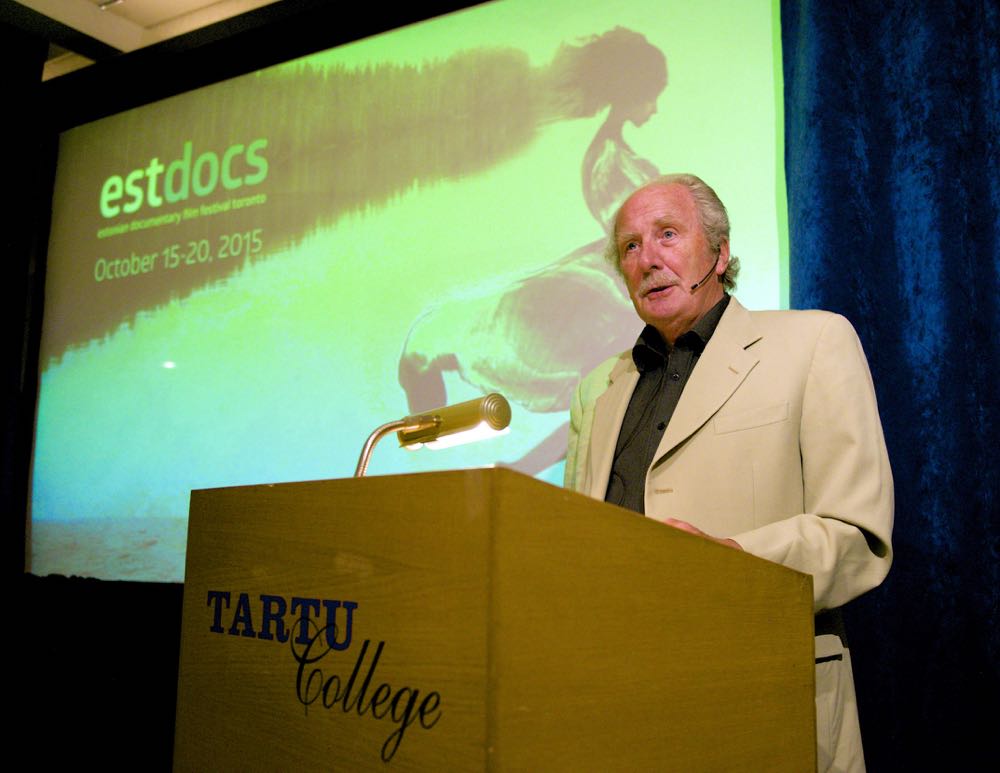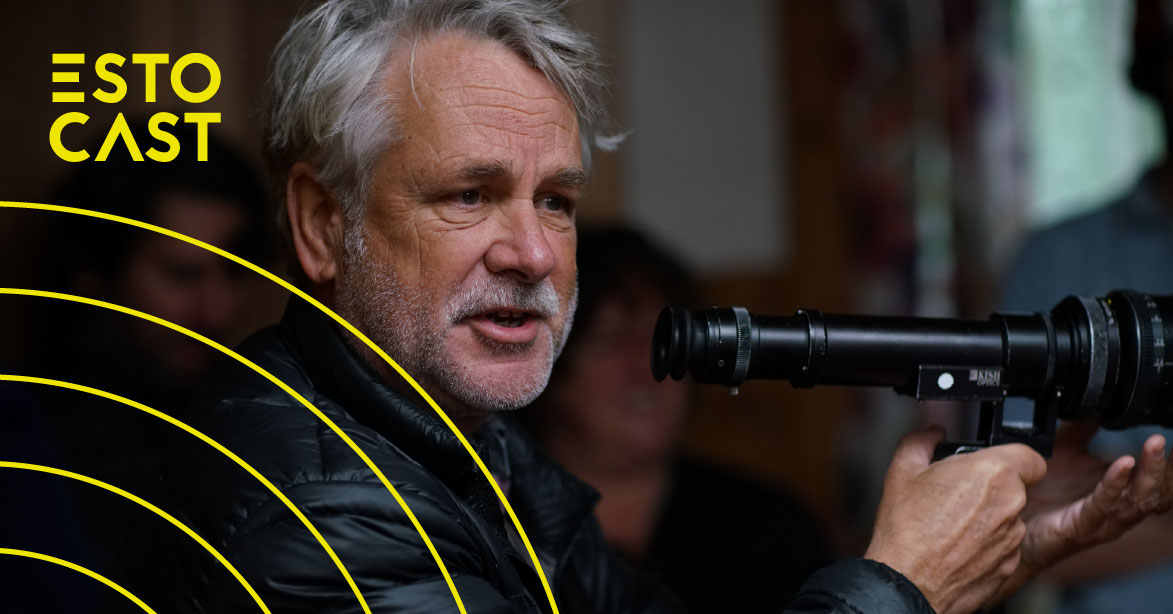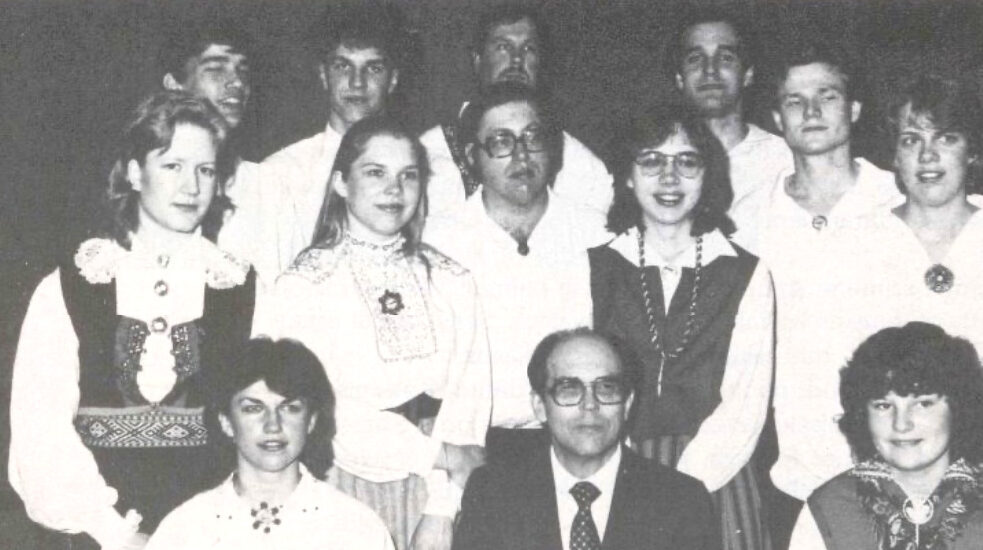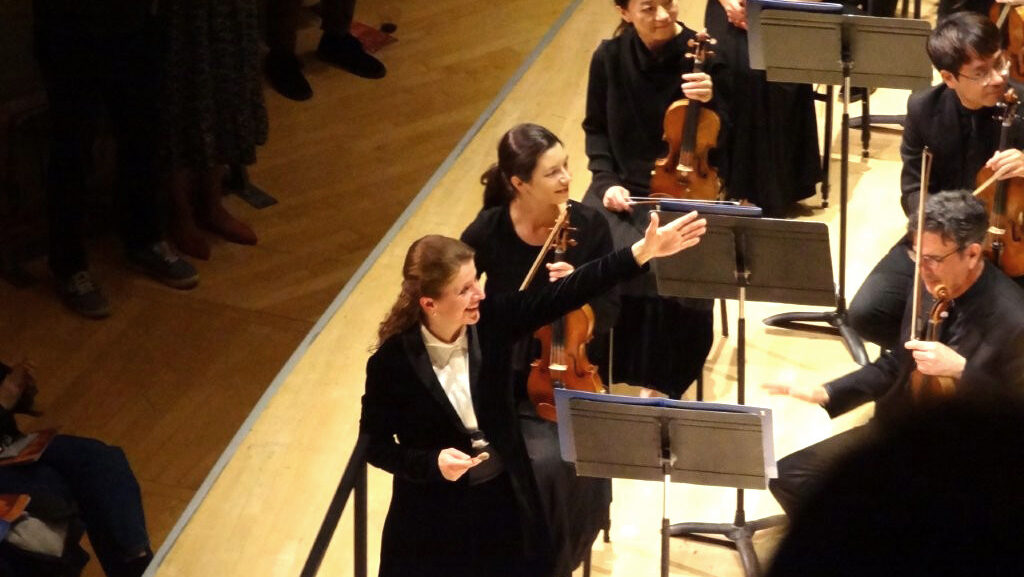Oct 20, 2015 (Toronto, Canada) … EstDocs, the highly successful Estonian Documentary Film Festival in Toronto (Oct 15-20, 2015), had the honour of presenting Jón Baldvin Hannibalsson, the former Minister for Foreign Affairs of Iceland at the gala film screening of “Those Who Dare” at Toronto's Bloor Hot Docs cinema. As part of the EstDocs program, Baldvin also gave a lecture titled “Transitioning from Totalitarianism to Democracy: Learning from the Baltic Experience”, after which he responded to a myriad of questions from the audience represented by Canadian communities, including Estonian, Finnish, Latvian, Lithuanian, Russian and Icelandic.
During his talk, Baldvin expanded on the topic of Baltic re-independence. His touched on various topics from the Baltic situation in the early 90s to present day Ukraine, and even the Middle East. Baldvin was asked whether a Northern alliance with the Baltic countries was a viable option in the future. Baldvin responded that a Nordic-Baltic union, as a structure of cooperation for eight countries, was something that he started to talk about right from the beginning of re-independence. He believes such a union could be successful in fields such as economics, science, the environment and other fields.
Baldvin added that the Baltic countries could utilize such cooperation in many ways and that he is an advocate of more university exchanges, both in research and with students. “”Such an alliance would create an economically strong and competitive region in Northern Europe, with some 30 million people – a strong unit to counter all the difficulties happening in Europe as a whole.”
“I think the general opinion among the political elite in the Nordic countries [about a Northern alliance] is positive. I think that the Baltic leadership has not been seeking it single-mindedly. After all, the Baltic countries are very different from each other. Estonians are oriented towards the Finns; Lithuanians are Catholics and Central Europeans. They are not perhaps all of the opinion that their future lies in this alliance. They will have to take the initiative, if they can be persuaded. It is realistic and it will be positively received by the rest of the Nordic countries.”
In response to what could be done about Putinist Russian propaganda in Europe and North America, Baldvin replied: “To counter it we need a new organization like we had during the Cold War with Radio Free Europe. An organization that effectively at every turn, on every point, in every case reveals the lies and falsifications. To do this you have to have conviction, you have to have passion.”
Background information:
The film “Those Who Dare” is a historical documentary about how the world reacted to the Baltic States' claim for re-independence from Soviet occupation in the years 1989-1991. The film follows the story of Mr. Jón Baldvin Hannibalsson, who entered the scene unexpectedly through his personal relationships with people in the Baltic States and he then championed their cause relentlessly as the then Minister for Foreign Affairs and Trade of Iceland.
Baldvin and Danish foreign minister Uffe Elleman Jensen were the staunchest supporters of the Baltic States at the United Nations, NATO and other institutions. Tthey spoke up for the Baltic countries in international politics whenever the opportunity arose. Both ministers realized that the international community had little or no interest in any change to their own state of peace, which the break-up of the Soviet Union threatened.
Baldvin was the only Western foreign minister to visit the three capitals in a very tumultuous and dangerous time, while actively showing the support of his country both at the political level, and by mingling with the demonstrating people on the streets.
Iceland was the first country to recognize the independence for the Baltic States following the coup in Moscow in August 1991, where hardliners tried to seize control of the Soviet Union. The rapid unfolding of events led to the collapse of the Soviet Union by December of the same year.
Background on EstDocs:
EstDocs is celebrating 11 years of bringing Estonian films to the Canadian public. The Estonian Documentary Film Festival & Competition in Toronto, is an audience festival and juried competition featuring films that have connection to Estonia. The festival features top documentary filmmaking talent from Estonia and around the world. Our mission is to provide a 360° perspective on Estonian history, politics, arts, culture, and social aspects.
Our expanding profile is attributed to high quality entries and provocative Q&A post screening sessions with the filmmakers/film experts via Estonia-invented Skype.
Further information: Maimu Mölder
e-mail: maimu@molder.ca
mobile: 416-770-8648
www.estdocs.com
#estdocs, Twitter @Estdocs ; Facebook.com/estdocs
See more – EstDocs 2015:
- EstDocs KAVA/PROGRAM GUIDE
- FOTOD – EstDocs 2015 lõpetas, võidufilmideks osutusid “Those Who Dare” ja “Ussinuumaja”
- FOTOD – EstDocs'i pühapäev: Balti Ülikooli lugu, Maestro ja Oreliga Tartu College'is
- FOTOD – EstDocs'i laupäev: Sisekõla ja Arvo Pärt | Robert Wilson: Kadunud paradiis Bloor Hot Docs Cinema's
- FOTOD – EstDocs'i eri: Hr. Jón Baldvin Hannibalsson'i loeng “Üleminek totalitarismist demokraatiani: õpetused Baltimaade kogemustest” Tartu College'is
- EstDocs 2015 moderaator Joonas Hellerma
- Joonas Hellerma – EstDocs moderator (in english)
- VIDEO/FOTOD – EstDocs galaõhtu Bloor Hot Docs Cinema's
- FOTOD – EstDocs 11 alusas piduliku õhtusöögi, aukülaliste ja ussinuumajaga
- PHOTOS – EstDocs appetizers: seven small gems launch this year's festival (in english)
- FILMID – EstDocs'il võistlevate lühifilmid ülevaade – 2015




